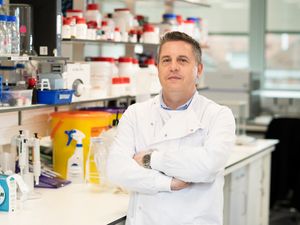Health
New Drug Offers Hope to Prevent Vision Loss in Diabetes Patients

A promising new drug treatment could significantly reduce the risk of vision loss in individuals with diabetes, according to groundbreaking research conducted by Queen’s University Belfast and funded by Diabetes UK. The study focuses on early intervention to address damage to the eye before it becomes irreversible, potentially offering a novel approach to slowing or preventing vision deterioration in those living with diabetes.
The research team, led by Professor Tim Curtis and Dr. Josy Augustine from the Wellcome-Wolfson Institute for Experimental Medicine at Queen’s University, collaborated with experts from King’s College London, the Medway School of Pharmacy, and the Medical University of South Carolina. Their findings are particularly significant given that diabetic retinal disease is a leading cause of vision impairment among adults of working age. It occurs when elevated blood sugar levels damage the blood vessels and nerve cells in the retina, which is essential for light detection. Without timely intervention, this condition can lead to severe sight problems and even blindness.
Professor Curtis emphasized the importance of early detection, stating, “Diabetic retinal disease often begins without symptoms, with early damage to the retina’s nerve cells and blood vessels happening long before people notice any problems with their vision.” Current treatment methods primarily address advanced stages of the disease, when the damage is often irreversible. The aim of this study was to explore whether administering a drug early in the disease process could halt its progression.
In their investigation, the researchers utilized a rat model of diabetes to test a drug known as 2-HDP. The results showed that this treatment effectively protected the retina’s nerve cells and blood vessels, reduced inflammation, and helped maintain visual function. The action of 2-HDP involves neutralizing toxic molecules that accumulate in the retina during diabetes, contributing to vision loss. Additionally, when examining retinal tissue from diabetes patients, the research team discovered the same harmful molecules targeted by 2-HDP, suggesting that the drug may also be effective in human cases.
Dr. Augustine remarked, “Our study reveals a potential new treatment to protect vision in people with diabetes by tackling early damage in the retina before it becomes permanent.” This finding opens the door to developing a new generation of drugs designed to mitigate visual impairment and improve the quality of life for millions globally.
The research also incorporated computer simulations that indicated the drug could easily penetrate cells within the body, paving the way for the potential development of oral tablet treatments in the future. “This breakthrough highlights the importance of early intervention in diabetic retinal disease and the pressing need for new, targeted treatments that can protect vision before lasting damage occurs,” Professor Curtis noted.
Mikayla Hu from Diabetes UK stressed the significance of these findings, stating, “Vision problems and sight loss are devastating for people with diabetes, and current treatments don’t tackle retinal changes soon enough.” She expressed pride in supporting the study and optimism for the future, saying, “We look forward to seeing how this early-stage research progresses and moves us closer to a treatment that could benefit people living with diabetes.”
Collaborators on this pivotal research included Dr. Evan Troendle and Professor Martin Ulmschneider from King’s College London, along with Professor Timothy Lyons from the Medical University of South Carolina and Diabetes Free South Carolina. The research results have been published in the journal Diabetologia, marking a significant step forward in the fight against diabetic retinal disease.
-

 Entertainment2 months ago
Entertainment2 months agoAnn Ming Reflects on ITV’s ‘I Fought the Law’ Drama
-

 Entertainment3 months ago
Entertainment3 months agoKate Garraway Sells £2 Million Home Amid Financial Struggles
-

 Entertainment2 months ago
Entertainment2 months agoCoronation Street’s Carl Webster Faces Trouble with New Affairs
-

 Health2 months ago
Health2 months agoKatie Price Faces New Health Concerns After Cancer Symptoms Resurface
-

 Entertainment2 months ago
Entertainment2 months agoWhere is Tinder Swindler Simon Leviev? Latest Updates Revealed
-

 Entertainment3 months ago
Entertainment3 months agoKim Cattrall Posts Cryptic Message After HBO’s Sequel Cancellation
-

 Entertainment2 months ago
Entertainment2 months agoOlivia Attwood Opens Up About Fallout with Former Best Friend
-

 Entertainment2 months ago
Entertainment2 months agoMasterChef Faces Turmoil as Tom Kerridge Withdraws from Hosting Role
-

 Entertainment3 months ago
Entertainment3 months agoSpeculation Surrounds Home and Away as Cast Departures Mount
-

 Entertainment3 months ago
Entertainment3 months agoMarkiplier Addresses AI Controversy During Livestream Response
-

 World2 months ago
World2 months agoCole Palmer’s Mysterious Message to Kobbie Mainoo Sparks Speculation
-

 Entertainment2 months ago
Entertainment2 months agoITV’s I Fought the Law: Unraveling the True Story Behind the Drama





















